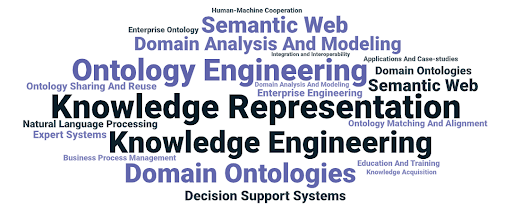We are happy to announce that we got two papers accepted for presentation at KEOD 20 (International Conference on Knowledge Engineering and Ontology Development). Knowledge Engineering (KE) refers to all technical, scientific and social aspects involved in building, maintaining and using knowledge-based systems. KE is a multidisciplinary field, bringing in concepts and methods from several computer science domains such as artificial intelligence, databases, expert systems, decision support systems and information systems.
Here is the pre-print of the accepted paper with its abstract:
- A Distributed Approach for Parsing Large-Scale OWL Datasets
Heba Mohamed, Said Fathalla, Jens Lehmann, and Hajira Jabeen.Abstract
Ontologies are widely used in many diverse disciplines, including but not limited to biology, geology, medicine, geography and scholarly communications. In order to understand the axiomatic structure of the ontologies in OWL/XML syntax, an OWL/XML parser is needed. Several research efforts offer such parsers; however, these parsers usually show severe limitations as the dataset size increases beyond a single machine’s capabilities. To meet increasing data requirements, we present a novel approach, i.e., DistOWL, for parsing large-scale OWL/XML datasets in a cost-effective and scalable manner. DistOWL is implemented using an in-memory and distributed framework, i.e., Apache Spark. While the application of the parser is rather generic, two use cases are presented for the usage of DistOWL. The Lehigh University Benchmark (LUBM) has been used for the evaluation of DistOWL. The preliminary results show that DistOWL provides a linear scale-up compared to prior centralized approaches. - Semantic Representation of Physics Research Data
Aysegul Say, Said Fathalla, Sahar Vahdati, Jens Lehmann, and Sören Auer.Abstract
Improvements in web technologies and artificial intelligence enable novel, more data-driven research practices for scientists. However, scientific knowledge generated from data-intensive research practices is disseminated with unstructured formats, thus hindering the scholarly communication in various respects. The traditional document-based representation of scholarly information hampers the reusability of research contributions. To address this concern, we developed the Physics Ontology (PhySci) to represent physics-related scholarly data in a machine-interpretable format. PhySci facilitates knowledge exploration, comparison, and organization of such data by representing it as knowledge graphs. It establishes a unique conceptualization to increase the visibility and accessibility to the digital content of physics publications. We present the iterative design principles by outlining a methodology for its development and applying three different evaluation approaches: data-driven and criteria-based evaluation, as well as ontology testing.

